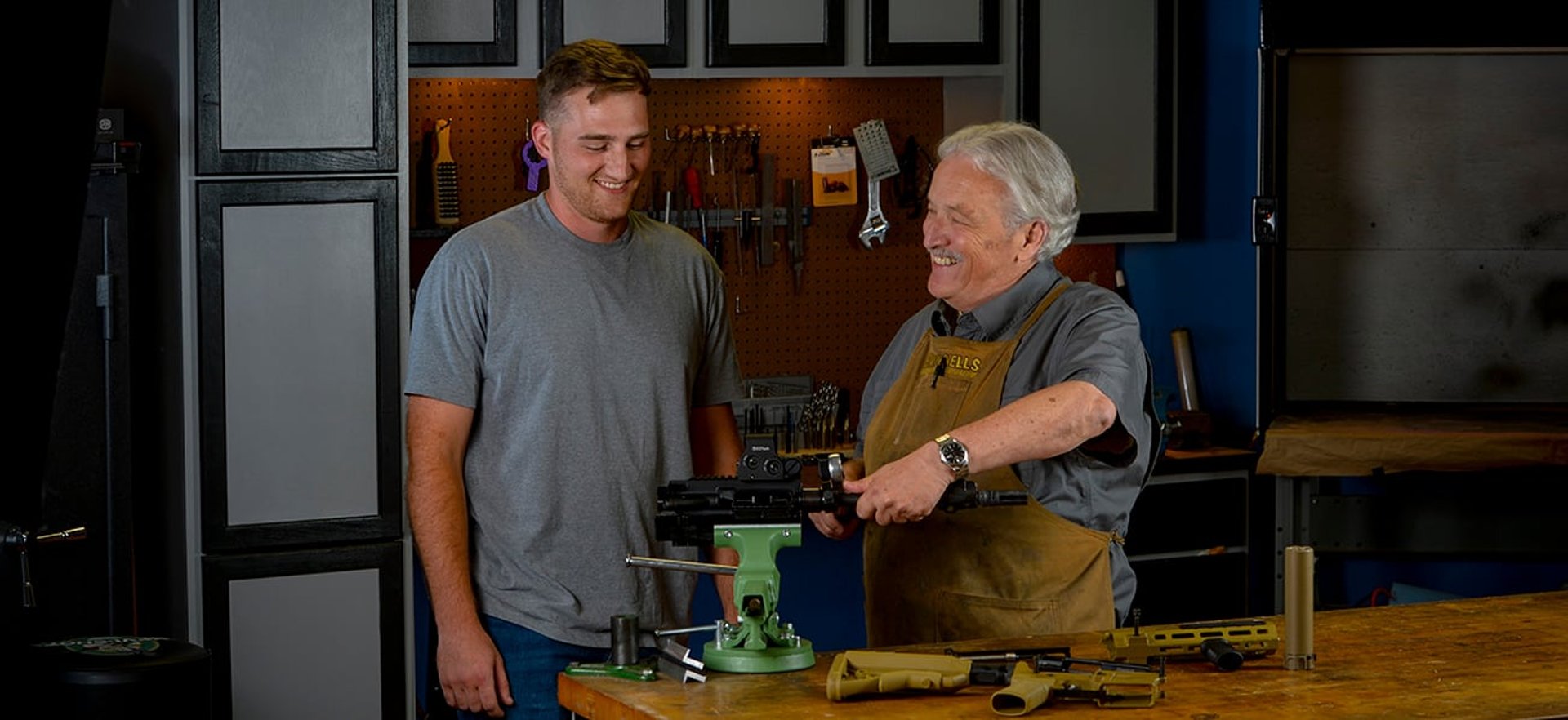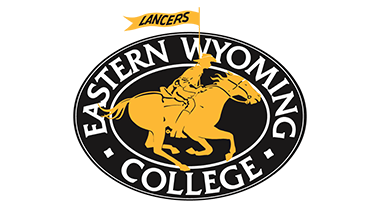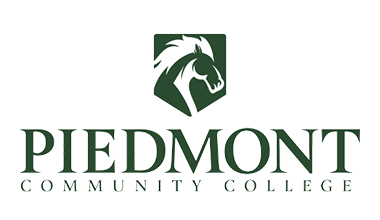Do you like firearms? Do you enjoy repairing, upgrading, and customizing guns for yourself and others? Is your idea of a fun-filled Saturday spent building an AR-15 from parts or restoring an older firearm? Do you find Zen creating order out of chaos?
If your answer to these questions is "YES," a career in gunsmithing could be right for you! Maybe you’ve already considered it and are wondering if making a living in that "ancient and noble" profession is economically viable in the 2020’s or if it’s more of a hobby or a side gig. How do you become a gunsmith in 2024 anyway and are gunsmith careers in demand?
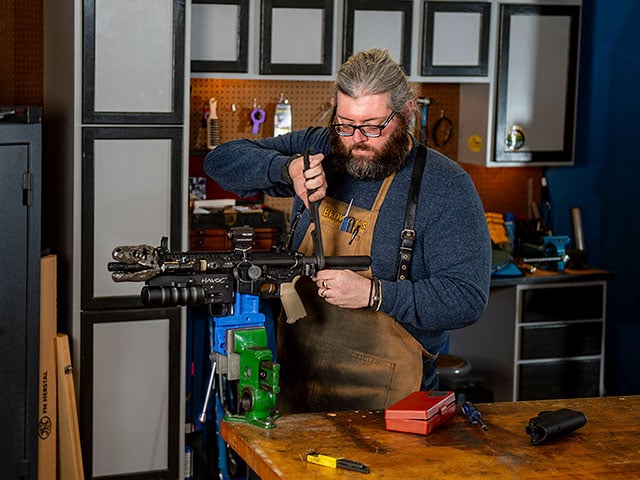
To begin, you must enjoy working with your hands, figuring out what makes mechanical things "tick," and diagnosing problems that prevent them from ticking as they should. Being a gunsmith requires patience, meticulousness, and an eye for detail. And you REALLY need to love firearms!
In 1938, Bob Brownell’s gunsmithing hobby was making enough profits to add part-time gunsmith to his list of businesses. 85 years later, we're hoping to encourage a new generation of gunsmiths from the millions of builders, tinkerers, and firearm enthusiasts we’re proud to serve.
Can You Make a Living as a Professional Gunsmith?
As with many skilled professions, there is a shortage of gunsmiths in the U.S. right now. This means prospects are good for a skilled, competent gunsmith to find work. Don't expect to get as rich as Elon Musk or Jeff Bezos as a gunsmith. Most of the gunsmiths we've talked to all tell us that if you want to make fast, easy money, being a gunsmith is not the way to do it.
Like all physical, hands-on, labor-intensive professions, a gunsmith must balance the time it takes to perform the work versus how much the "market will bear" in what you can charge customers. How successful you are will depend largely on the quality of your work, how you treat your customers, your ability to deliver completed work when you say you will, and all the usual factors involved in running a business.
Let's get down to nuts and bolts. The Gunsmithing Technology program for Iowa Community College in Grinnell, Iowa, reports that the average annual salary for a pro gunsmith is $50, 457, based on U.S. Bureau of Labor Statistics data. Based on survey data, Indeed.com reports that the average annual salary for a gunsmith is $45,814 and can go to $74,718 on the high end (data compiled July 7, 2024). That's not Big Bucks, but depending on where you live and your lifestyle, that's not poverty wages either. (We'll caution that starting salaries for new gunsmithing school graduates are lower.)
Be cautious about treating these average salary numbers as Gospel Truth. Some highly skilled gunsmiths, who serve as custom gun makers, earn excellent livings. This is certainly a profession where individual talent, skill, intelligence, insight, and drive still play a huge role in how successful a person is. As with any career path, it pays to talk to people who work in the business before pursuing it yourself. While your local gunsmith isn't likely to disclose his annual income, if you're on friendly terms with him, he can probably give you a good idea of what kind of a lifestyle the gunsmithing trade can support.
One Destination, Many Routes - Real-World Gunsmiths' Stories
How do folks arrive at gunsmithing as a career? Most actually do not graduate from high school and immediately go off to gunsmithing school. A surprising number of the gunsmiths we talked to started out on other career paths before becoming gunsmiths.
Brownells Sr. Tech Support Gunsmith Dean Batchelder had been into firearms when he was young, then he went to college and pursued a career in an unrelated field. "I got back into firearms in my late 30s and started hanging around a gunsmith shop in my spare time and helping out doing things." The gunsmith at the shop and another friend, "told me I should think about going to gunsmithing school, so I did at the age of 41 and never looked back." Does Dean regret anything? "I wish I had gone to gunsmith school long before I did!"
Matthew Bates, proprietor of BGW Gunsmithing in Nampa, Idaho, is an excellent example of a gunsmith who did not follow a simple, straight path into the profession. Matt, who was pictured on the front of Brownells Big Book #73 in 2021, grew up in southern California and graduated from college with a mechanical engineering degree. A side job working at a gun store introduced him to gunsmithing, and he found he really enjoyed the "hands on" of working on guns. A one-week summer gunsmithing class prompted him to re-evaluate his engineering career, and he enrolled in the two-year gunsmithing program at Lassen Community College. After working in and eventually managing a gunsmithing shop, Matt was ready to strike out on his own. But California is not friendly to our firearm freedoms, and “I wanted to raise my family in a free state.” An intensive search and advice from a friend led him to move to Idaho and set up shop there.
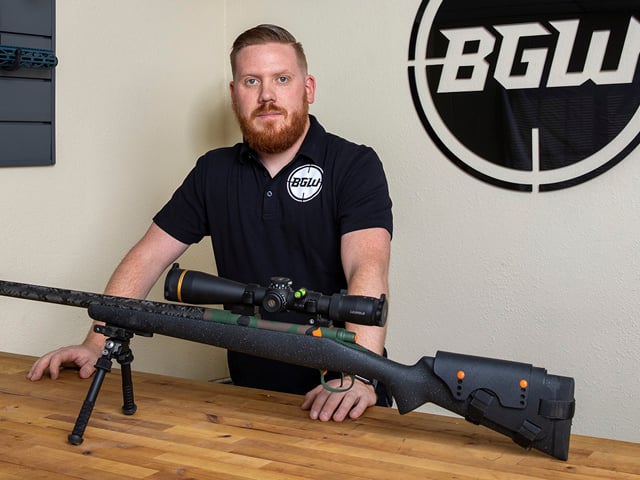
Brownells Sr. Gun Tech™ and ever-calm, reassuring video host Steve Ostrem first served in the U.S. Army in the Military Police. After his service, he earned degrees in both French and German (even spent a year studying in Germany), and only THEN did he embark on his gunsmith career. Along the way, he also became a Class A machinist before joining Brownells in 2004.
Steve's partner in video banter, Caleb Savant, served as a Combat Engineer in the U.S. Army, then transitioned to a gunsmithing career, first in his native Louisiana, where he handled warranty repairs for major companies, as well as repairing guns and building custom guns for local clients.
Gaining the Skills You Need to Become a Gunsmith
You've decided to commit. A career in gunsmithing is the right one for you. Now, you're wondering, "How do I get the skills I need to become a gunsmith? What kind of training do I need?" There are three paths a person can follow into the gunsmithing profession: self-teaching, apprenticeship, and going to gunsmithing school. Most folks follow some combination of all three.
Skills You Already Have & Self-Teaching
Many folks get started in gunsmithing as a hobby. They work on their own guns and learn what they need to know to tackle each project. As time goes on, the person's skills grow, and they take on more and more complex projects. If you're already installing sights, mounting a scope, changing triggers, and performing other upgrades, you're already on the road to becoming a gunsmith. You may start out on modular modern guns, then work back to older, more complex firearms. When you work on a gun, you develop a firm knowledge of how it works.
In fact, that's how our founder Bob Brownell got started! He was a knowledgeable, skilled amateur, entirely self-taught, who "hung out his shingle" to provide gunsmithing services in Montezuma, Iowa, in 1939.
An amateur who did it for a long time got so good he became a pro is not entirely unheard of even in the 2020s, but it is a long, slow path, maybe one more followed by happenstance than with intention.
A lot of gunsmiths started out as machinists and tool-and-die makers, where you pick up a lot of skills and knowledge that transfer directly to gun work. As noted above Brownells Gun Tech™/video host Steve Ostrem worked as a machinist. As one Reddit contributor puts it, ‘if your gunsmith career doesn't pan out or you realize it's just not for you, you still have marketable skills with which to make a living in another industry.’
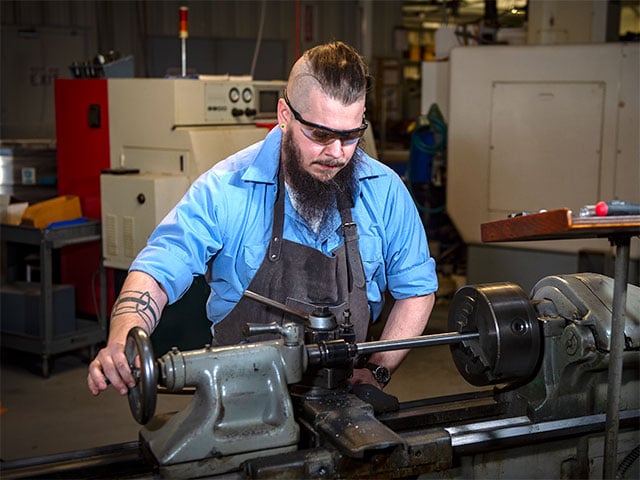
Dave Dove, a custom gunsmith well known in the lever action rifle community, started life as a machinist, and "the experience I gained there has helped me tremendously, especially when it comes to the custom gun work I do.” Dave's specialty is custom takedown lever action rifles, including "switch barrel" lever guns that can change caliber simply by swapping barrels. That's quite a well-defined niche, and among lever action rifle fans, Dave's work is highly prized. He has a long waiting list for work.
Gunsmiths are always learning by doing. Nothing beats getting your hands dirty working on a gun and learning about it along the way. Many gunsmiths, current and future, practice on "junk" guns. They buy an inexpensive, old, broken or worn-out gun and then work on fixing it or practicing specific skills. If something goes wrong, they learn from the experience and haven't damaged a good firearm.
Apprenticeship / Mentorship
An outgrowth of self-teaching is being "taken under the wing" by an experienced professional gunsmith who will teach you advanced skills. You can work for this gunsmith handling simple jobs and then build up your skills. The old term "apprenticeship" really describes this kind of relationship. You build hands-on experience and learn from a pro who's "been there, done that," but it is also a somewhat slow process.
Many gunsmiths' development includes having one or more mentors who can guide them, give them advice, and when a project goes south, explain what you did wrong and how to fix it. These mentoring relationships are often informal.
There's no blueprint for following the apprentice path. They often come about informally, often by hanging around a gun store with a resident gunsmith and you may need to network and meet various gunsmiths to establish a connection, but opportunities are out there.
More formal ways to find apprentice opportunities are through a gunsmithing school, an employer such as a firearm manufacturer, or through The Association of Gunsmiths and Related Trades (TAOGART), an organization dedicated to developing apprenticeship programs and connecting student gunsmiths with them.
Gunsmithing School
Nowadays, many folks who go into gunsmithing as a profession attend a gunsmithing school. These schools usually offer a two-year program leading to an Associate of Science degree in gunsmithing, as well as certification and training programs in specific skill areas. The biggest benefit of gunsmithing school is getting hands-on experience with facilities and resources you would not be able to access while on the self-taught path, as well as an organized, comprehensive course of study taught by experienced gunsmiths.
Typically, students receive hands-on training in a multi-faceted and well-rounded gunsmithing curriculum. Courses usually include an in-depth study of machining, precision rifle building, general and advanced firearm repair, stock making, handgun repair and customization, metal finishing, and modern sporting firearms.
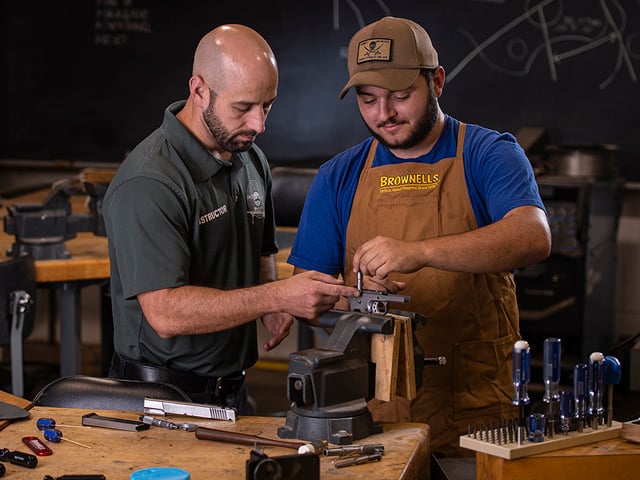
The gunsmithing program at Montgomery Community College in Troy, North Carolina, is a good example of what you'll find at a top gunsmithing school. In addition to the classrooms and labs you'll find at any community college, it has two complete machine shops with a full complement of lathes, milling machines, grinders, and tooling specific to gunsmithing. Facilities also include bluing and polishing equipment and a painting area complete with paint booths and large ovens for applying modern painted finishes like Cerakote®. The college has an extensive firearms library containing examples of common firearms found in the industry. The cherry on top: the campus has an on-site firing range that is used for test-firing and training.
While we have been talking about traditional, in-person schools, there are some online/correspondence schools for gunsmithing as well. Brownells Sr. Tech Support Gunsmith Dean Batchelder recommends going to a traditional, in-person gunsmithing school, where you'll have access to a full array of machinery and equipment. As with any schooling, "The degree to which you apply yourself has a lot to do with how much you learn," says Dean. "Do not plan to be spoon fed, being gunsmith is a career you have to have commitment to."
MGS Trade School, for example, is an accredited modern gun school with in-depth programs that are affordable and allow students to work at their own pace, making it possible to pursue your passion in gunsmithing while continuing to work an existing job. However, if students expect to graduate, they must complete their first lesson within 30 days of enrollment, complete monthly progress check-ins, maintain a minimum 70% grade average, and complete their program within 150% of the published length of the program. Founded in 1946, MGS has educated more than 60,000 students and established itself as one of the oldest and most distinguished distance-learning gunsmithing schools.
"Find a reputable school, do all the extra projects they offer," says Brownells Gun Tech™ Kyle Bingham, "Accept that because it is such a manually practical field that you are going to make a lot of mistakes early on and you will get to learn to fix them, that’s part of the fun. Patience needs to be one of your top virtues, this is not a field for the easily frustrated."
Certifications & Licensing
Gunsmithing is a unique profession in that one does not need a state or local license to set up shop as a gunsmith. This means gunsmiths are largely free from bureaucratic regulation - beyond that which affects any business nowadays. You will, of course, need any local licensing required to open a business.
So how does a potential customer know if a gunsmith they're considering is up to the job? It’s important to ask questions and assess if the ’smith’s recommendation syncs with your own experience. Maybe start him out on a simpler job before trusting him with a full restoration of Grandad's finely engraved vintage L.C. Smith or A.H. Fox shotgun. This is an important opportunity for the gunsmith to engage in some careful "marketing". We hesitate to use the word, but it is appropriate. Your presentation on your website and social media, as well as your direct personal interactions, should be geared to reassure the customer of your experience, your qualifications, and your trustworthiness.
One license you WILL need as a gunsmith is a Federal Firearms License, issued by the Federal Bureau of Alcohol, Tobacco and Firearms (ATF). An FFL is absolutely necessary for buying, selling, and shipping firearms and receiving serial-numbered items like receivers. Even if you're not running a full retail store, you will be occasionally buying and selling firearms. You can apply for an FFL at the ATF website. This is a serious and important legal process, so be absolutely certain all the information you provide on your application is 100% accurate. You will be required to complete a face-to-face interview with a local ATF Industry Operations Investigator (IOI) to verify information on your application and check your knowledge of Federal firearm laws. As with the written application, accuracy and truth in your responses is critical.
Although a gunsmith can get by without having an FFL if he works for another gunsmith or a shop that has one, it's a necessity for a sole proprietor. And it's also a handy source of extra income, both from buying and selling firearms and from the fees you can charge folks who purchase guns online and pick them up at your shop. While it is possible to buy a firearm from an online e-seller (Brownells offers a huge selection!), that gun cannot be sent directly to the purchaser if he/she does not have an FFL. Most ordinary gun owners do not, so the firearm must be shipped to an FFL holder in their area. Obviously, a gunsmith or gun store is not going to offer that service "pro bono," hence they charge a small fee, which can supplement your income from gunsmithing services.
Building Your Career After School / Apprenticeship
Another benefit of attending a gunsmithing school is help with finding a job or an internship after you graduate. Employers know the quality of the training programs at the schools and are therefore more likely to give a graduate serious consideration. As in many professions, getting out and meeting employers, networking, and knowing "a friend of a friend" helps you find leads to employment. Internships are often excellent avenues to demonstrate your skills to an employer before they commit to hiring you.
A career as a gunsmith does not necessarily mean owning a gun store or setting up a one-person shop, though that is the preference of many gunsmiths. Many gunsmiths are employed by gun shops or major sporting goods stores that sell firearms. You can also work as a technician at a firearm manufacturer. Not every gun comes off an assembly line functions perfectly, and every manufacturer has technicians on hand to inspect finished guns and make final tweaks and adjustments. Firearm distributors often employ technicians to inspect incoming firearms and/or to effect repairs on returned merchandise.
Many larger law enforcement agencies employ repair technicians, as does the U.S. military. For those who want to join the military, a Small Arms Repair Technician is an MOS (military occupational specialty).
If you do strike out on your own and start your own shop, you'll need some extra skills beyond gunsmithing. You'll need to know how to run a business, manage cash flow, income and expenses, pay taxes, customer service, and marketing your services.
The need for general repairs and refurbishment will bring some customers through your doors, however, many gunsmiths often combine that work with a specialty. To do this, find a niche that is not served in your community, recommends gunsmith Dave Dove. Do unique or custom work that few if any other gunsmiths offer. Dave's specialty is custom takedown lever action rifles, including "switch barrel" lever guns that can change caliber simply by swapping barrels. That's quite a well-defined niche, and among lever action rifle fans, Dave's work is highly prized. He has a long waiting list for work.
Final Thoughts
As you have probably deduced from reading this article, being a gunsmith is more than punching a time clock from 9-5. It is truly a career, something you do as much for the intrinsic reward of building, rebuilding, repairing, and making things, as you do for the financial reward. Dean Batchelder recalls something the playwright Lillian Hellman said that has guided him: "It’s a sad day when you find out that it’s not accident or time or fortune, but just yourself that kept things from you." Dean's advice: "Don’t wait for accident, time or fortune to happen, you go after it."
Success in the gunsmithing profession requires a "flexible mind," says Brownells Gun Tech™ Kyle Bingham, and the ability to come up with "'alternate solutions' to problems. The wider your knowledge base, the easier this becomes. Keep notes, not just on firearms, but for specialty tools you made or quirks about disassembly/assembly of certain firearms and where to find parts, tools, or specialty repair houses. Don’t be afraid to ask for help. Old gunsmiths generally love showing the newer generation tips and tricks in my experience, plus you always have the helpful and knowledgeable techs at Brownells to call. Also, it's ok to refuse work. There are some projects that just aren’t worth the frustrations associated with them."




